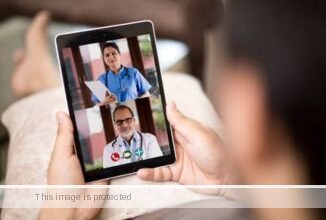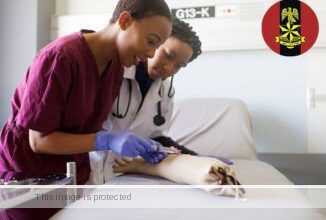Nursing Schools in Abuja and Their Fees (Private and Federal)
Do you want to know the names and list of accredited private and federal nursing schools in Abuja and their fees, entrance exam, cut-off mark, admission form portal, JAMB requirements, and location?
If YES, then this is the only post to read.
Nursing is a noble profession and nurses are essential to the health sector hence the demand for their services in Nigeria.
It is a career path you will enjoy if you can study to become a professional nurse because their courses are quite challenging to learn.
A person who is not hardworking and dedicated to his/her studies cannot read nursing as it requires time, dedication, and hard work to graduate as a professional nurse successfully.
In addition, you must be good at Chemistry, Biology, Math’s, and other demanding subjects to come out with flying colors.
Getting started…
Nursing Schools in Abuja
Here are the best schools of nursing in Abuja:
1. School of Nursing (SON), Gwagwalada Specialist Hospital, Abuja
School of Nursing Gwagwalada is located in Gwagwalada specialist hospital, Abuja.
It is one of the highest ranked Nursing institutions in Nigeria and offers courses like cardiothoracic nursing, anesthetic nursing, ophthalmic nursing, and perioperative nursing.
SON is a federal institution where you can develop your nursing skills.
Yearly, candidates are admitted into two different nursing programs:
The 3-Year Nursing Program
This nursing program is available to O’Level certificate holders who want to read nursing.
The admission application is always available in September every year.
18 Months Post-Basic Nursing Programme
This nursing program is only available to qualified midwives, and the admission application is always open every March.
Fees
The School of Nursing (SON), Gwagwalada fees are as follows:
- First-year students pay the sum of ₦163,000 only.
- Second year and third-year students pay ₦25,000 only.
The students receive a monthly stipend of ₦12,000 till they graduate.
2. School of Midwifery (SOM), Federal Capital Territory, Abuja
SOM school is located in Garki, Abuja.
It is rated as one of the best midwifery schools in Abuja.
It is relatively cheaper compared to other nursing schools owing to the kind of training they offer.
Offers like scholarships are available to the students.
The school has standard facilities for training the students and its accessible to O’level certificate holders.
Abuja School of Midwifery is a government institution and also provides well-furnished accommodations for its students to live in till they graduate.
So, you don’t have to worry about accommodation if you choose this school.
Also, you don’t need to write JAMB to get admitted into the institution.
Fees
- First-year students of Abuja School of Midwifery pay ₦153,000 only.
- Second year and third-year students pay ₦25,000 only.
The students also receive a monthly stipend of ₦12,000 until graduation.
However, it has not been confirmed if the salary is available to all admitted students or only some students on scholarships.
3. National Open University of Nigeria (NOUN), Abuja
Department of Nursing, National Open University of Nigeria, Abuja, combines both theoretical and practical aspects of nursing to equip students to become competent and professional nurses.
Pediatric nursing, psychiatric nursing, medical surgical nursing, and many more are curriculums available in the institution.
With the accreditation of the Department of Nursing, National Open University of Nigeria (NOUN) by the National Universities Commission (NUC), and the Nursing Midwifery Council of Nigeria (NMCN), you don’t have to worry about your program being completed at the institution, as your degree award is safe and secure.
The National Open University of Nigeria (NOUN) offers admission into the nursing program without JAMB.
You don’t have to write JAMB to read nursing in NOUN.
Fees
Their admission is not into 100 levels as a new intake.
You will spend four years completing your nursing training in NOUN (200L to 500L) and a one-year internship.
The four years are split into eight semesters, with a year having two semesters.
- In the 200L first semester, you will pay ₦56,000 and ₦53,000 in the second semester.
- In the 300L first semester, you will pay ₦48,000 and ₦36,500 in the second semester.
- In the 400L first semester, you will pay ₦38,000 and ₦47,500 in the second semester.
- In the 500L first semester, you will pay ₦41,500 and ₦50,000 in the second semester.
4. School of Post Basic (SOPB), Nephrology Nursing, National Hospital, Abuja
Nephrology nurses work with patients who have kidney diseases and are at risk of kidney problems.
So, if you wish to study Nephrology Nursing in Abuja, here is where you can do that.
The Department of Nursing, National Hospital Abuja, runs under the Directorate of Clinical Service and focuses on giving high-quality, effective healthcare to individuals and communities.
They aim to show a high sense of commitment and responsibility to the nursing profession.
Also, they collaborate effectively with other healthcare workers by sharing information and participating in inter-sectoral and interdisciplinary activities.
To qualify, you must be a registered nurse with a current practicing license issued by the Nursing and Midwifery Council of Nigeria and an O’level GCE, WASCE, or its equivalent (must credit at least five subjects in not more than two sittings).
Note that the Post Basics Nursing programs last for 12 months.
Fees
The total fees are not made public.
You can go to the school to check for the fee cost.
However, candidates who are interested in studying at the institution are required to pay a non-refundable sum of ₦5,200 upon collection of application forms.
5. School of Post Basics (SOPB), Critical Care Nursing, University of Abuja Teaching Hospital (UATH)
Critical care nurses are registered nurses who monitor/treat patients who are critically ill, as well as provide basic care.
SOPB, the University of Abuja Teaching Hospital (UATH), provides opportunities for registered nurses to further their education and expertise in Critical Care Nursing and advance their skills and knowledge.
To qualify, you must be a registered nurse with a current practicing license issued by the Nursing and Midwifery Council of Nigeria and possess an O’Level GCE, WASC, or its equivalent in not more than two sittings and must credit all five subjects: English Language, Maths, Physics, Chemistry, and Biology.
Fees
UATH Post Basics Critical Care Nursing fees are based on the programs you are taking.
Aside from hostel accommodation money, the cost is estimated at ₦150,000 to ₦200,000 per session.
How many years does it take to study nursing at the school of nursing in Nigeria?
The duration of nursing programs at schools of nursing in Nigeria is typically three years.
These three years are split into six semesters, each year having two semesters.
This applies to the Basic General Nursing program, which is the entry-level program for aspiring nurses.
During these three years, students receive theoretical and practical training in various aspects of nursing, including nursing fundamentals, medical-surgical nursing, pediatric nursing, obstetric nursing, psychiatric nursing, community health nursing, and more.
The curriculum is designed to meet the requirements set by the Nursing and Midwifery Council of Nigeria (NMCN), which is the regulatory body for nursing education in the country.
Upon successful completion of the three-year nursing program, graduates are awarded the Registered Nurse (RN) qualification and are eligible to write the professional examination conducted by the Nursing and Midwifery Council of Nigeria (NMCN).
After passing the examination, they become registered nurses and can practice nursing in Nigeria.
Do I Need JAMB to Study in the School of Nursing?
You do not need to sit for the Joint Admissions and Matriculation Board (JAMB) examination to gain admission into a school of nursing in Nigeria.
JAMB is primarily associated with admissions into universities and other tertiary institutions in Nigeria.
Schools of Nursing have their own separate admission processes and requirements.
They usually conduct their own entrance examinations, interviews, and selection procedures for admitting students into their nursing programs.
The admission criteria for nursing schools may include meeting certain academic qualifications, passing the school’s entrance examination, and satisfying other specific requirements set by the school and the Nursing and Midwifery Council of Nigeria (NMCN).
It’s important to note that while JAMB is not required for admission to a school of nursing, candidates may still need to meet specific academic qualifications, such as having a minimum number of credits in relevant subjects at the Senior Secondary School Certificate Examination (SSCE) or its equivalent.
Check the specific admission requirements of the school of nursing you are interested in, as they may have their own unique criteria and procedures for admission.
Visit the official website of the School of Nursing or contact their admissions office directly for accurate and up-to-date information on their admission process.
Conclusion
One good thing about nursing schools is that not all of them require JAMB examination to gain admission.
Also, in some of the nursing schools in Abuja, the students receive monthly stipends and free accommodations.
Although nursing can be very challenging, you must be hardworking and dedicated to your studies to become a professional nurse upon graduation.







How can I apply through online while I am from Maiduguri?